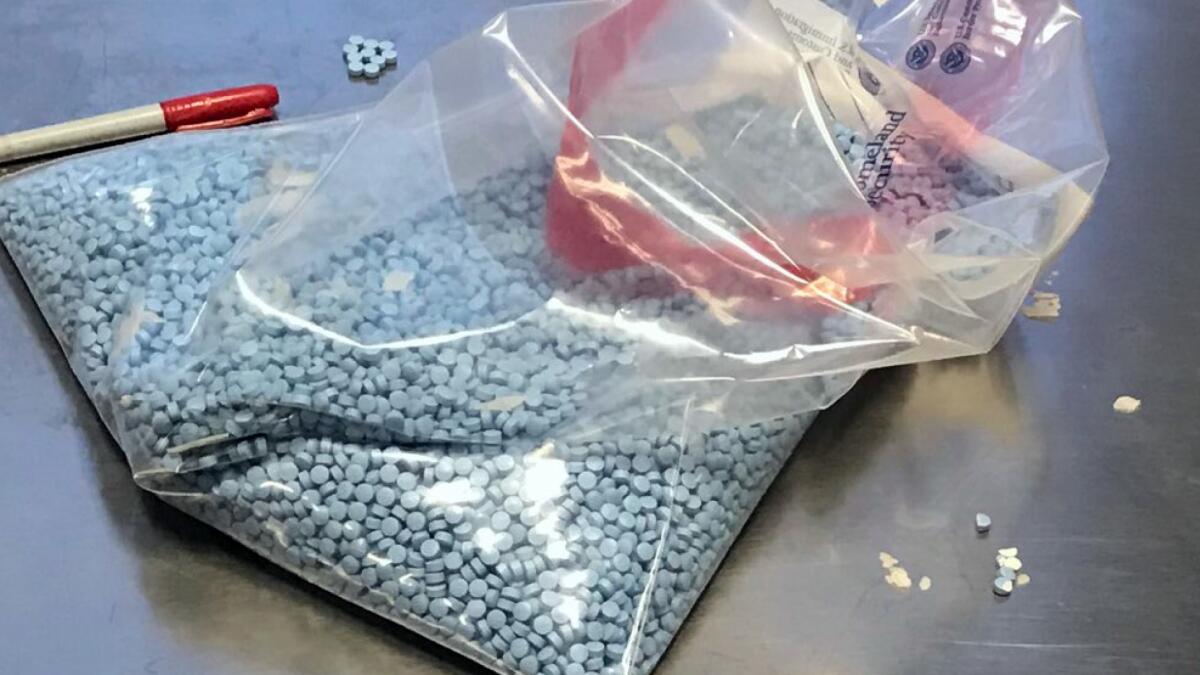Trial begins in case of Newport Beach bar employee accused of selling fentanyl that left 1 dead in 2016

- Share via
Jurors in the case of an Aliso Viejo man accused of selling fentanyl to a person who died and three others who collapsed six years ago in the Newport Beach bar where he worked heard testimony Wednesday from his former co-workers and paramedics who treated the victims.
Attorneys for the U.S. allege Sean Robert McLaughlin, 42, sold fentanyl that killed then-25-year-old Ahmed Said of Santa Ana and caused three of his friends to lose consciousness near the dance floor at American Junkie, formerly at 2406 Newport Blvd., in the early hours of Friday, Nov. 18, 2016. He is also accused of dealing MDMA, hydrocodone, methamphetamine and cocaine in a six-count indictment filed May 12.
McLaughlin’s attorney, Dan Chambers, said numerous other people at the packed nightclub that evening could have sold the opioid that killed Said and sent two of his friends, Josh Selley and Daron Muratyan, to hospitals. He also said drug use appeared to have been “rampant” at the now-closed bar.
“We think the videotape shows something very different than what the government says,” Chambers said. “We think there were multiple people there that night who were providing drugs to these individuals.”
Footage recorded that morning and played in court Wednesday showed what appeared to be Selley handing cash to McLaughlin, standing mostly out of frame, near an elevator on the second floor of the bar at 12:28 a.m. At 12:54 a.m., a group of patrons spotted Said unconscious on the ground in that same area. At about that time, staff were attempting to rouse Selley and Muratyan as they slipped in and out of consciousness in a booth at the bottle service section of the bar.
Carly Burch was the floor manager and events director at American Junkie at the time and was at the bar to pick up paperwork that evening, she said from the witness stand Wednesday. She said she and other employees initially thought the victims had had too much to drink. She was talking to Selley and shaking him in hopes of waking him up, but he was almost completely unresponsive.
“He couldn’t keep himself up, and his eyes were closed,” Burch said.
Staff called 911, cut the music and cleared out the bar while waiting for paramedics. As they tended to Said, Selley and Muratyan, one of their friends, Frankie Alvarez, appeared to lose his footing in surveillance footage. Employees caught him before he fell to the ground.
Aaron Reed of the Newport Beach Fire Department was one of the first paramedics to arrive. He said he encountered a “chaotic scene” during testimony.
“You don’t normally see that many people overdosing at once,” he said. “At least at the time, but things might be different now,” he added, alluding to a growing rate of fentanyl distribution and overdoses in Orange County and nationwide.
Reed said the two people he personally treated that night had “pinpoint pupils” and shallow breathing, telltale signs of an opioid overdose. He had to administer a “significant amount of Narcan” in order to get them to breathe normally again. Narcan is a brand-name variant of the drug naloxone, which blocks the effects of opioids like fentanyl.
Police searched the bar that evening and found a vacuum-sealed pouch and glass vials filled with a crystalline powder, a large number of pills and small baggies decorated with black scorpions inside a locker used by staff. A former bartender for the business, Briana Borski, said that locker was being used by McLaughlin and secured with his padlock.
Police also found a baggie with a black scorpion design on it containing a white powder in a notebook stored in a different locker, which was used by a former employee, Dalton Rosene, and not secured with a lock.
Rosene said the notebook belonged to him, but he denied ever seeing the pouch or using narcotics during testimony Wednesday. He said it wasn’t uncommon to find patrons taking drugs in the bar.
Borski said customers caught using narcotics would get kicked out of the business almost every weekend. She also said McLaughlin would occasionally provide her with Adderall to help her stay alert through long shifts.
Borski said the defendant did not ask her to pay for the prescription medication, and she did not recall witnessing the defendant distribute it to other employees. She also struggled to remember the specifics of statements she gave to detectives.
When asked whether she saw McLaughlin in the courtroom, Borski was unable to recognize him as he sat in a wheelchair with a much heavier build than the one he had in surveillance footage from six years ago.
Attorneys for McLaughlin did not specify why he appeared in the courtroom using a wheelchair.
All the latest on Orange County from Orange County.
Get our free TimesOC newsletter.
You may occasionally receive promotional content from the Daily Pilot.






